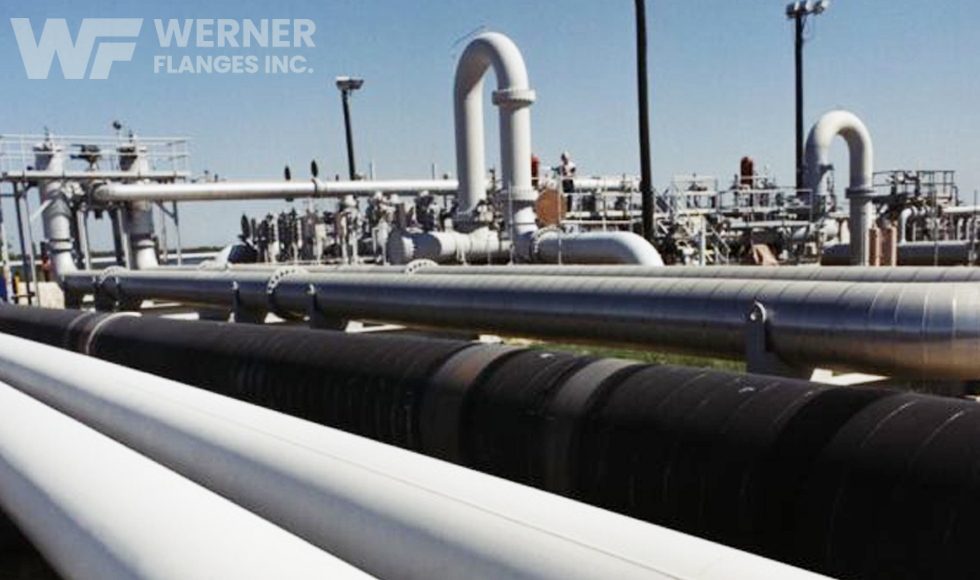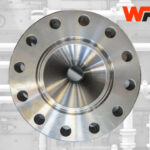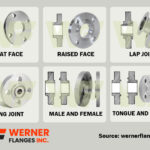In the demanding environment of oil and gas operations, the integrity of piping systems is non-negotiable. Pipe flanges serve as critical connection points throughout these systems, bearing the responsibility of maintaining leak-tight seals under extreme pressures, temperatures, and corrosive conditions. The selection, installation, and maintenance of these seemingly simple components can mean the difference between smooth operations and catastrophic failure.
Pipe Flanges for Oil & Gas Industry
Pipe flanges are mechanical devices that create strong, removable connections between pipe sections and equipment. They consist of a flat circular disk with bolt holes around the periphery and are typically manufactured from materials compatible with the system’s operating conditions and fluid properties.
The primary functions of flanges include:
- Creating secure, leak-tight connections
- Allowing for system disassembly for maintenance
- Accommodating transitions between different piping components
- Enabling equipment isolation when necessary
Types of Flanges Common in Oil & Gas Applications
Weld Neck Flanges
These flanges feature a tapered hub that transitions into the pipe wall, providing excellent load distribution and resistance to bending. They’re preferred for high-pressure, high-temperature applications where safety concerns are paramount.
Slip-On Flanges
Easier to align and install than weld neck flanges, these slide over the pipe and are welded both internally and externally. While less expensive, they provide less mechanical strength than weld neck designs.
Socket Weld Flanges
Popular for smaller diameter piping, these flanges create a socket that the pipe fits into before welding. They offer good pressure resistance with minimal turbulence.
Lap Joint Flanges
Used with stub ends, these flanges allow for rotation during installation, making alignment easier. They’re ideal for systems requiring frequent disassembly.
Blind Flanges
Solid disks without a bore, these flanges serve to blank off pipes, valves, or pressure vessel openings, effectively creating a “dead end” in the system.
Threaded Flanges
Featuring internal threads that mate with pipe threads, these flanges eliminate the need for welding, making them suitable for applications where welding is impractical.
Material Selection: Critical for Performance
The extreme conditions in oil and gas applications demand careful material selection. Common flange materials include:
- Carbon Steel (ASTM A105): The industry workhorse for moderate conditions
- Stainless Steel (304/316): For corrosive environments
- Low-Temperature Carbon Steel (ASTM A350): For cryogenic applications
- Chrome-Moly Alloys (F11/F22): For high-temperature service
- Duplex and Super Duplex Stainless Steel: For highly corrosive environments
- Nickel Alloys (Inconel, Monel): For extreme corrosion resistance
Industry Standards and Specifications
Flanges used in oil and gas must conform to rigorous standards that ensure interchangeability and performance:
- ASME B16.5: Standard for pipe flanges and flanged fittings
- ASME B16.47: Large diameter flanges (NPS 26 through NPS 60)
- API 6A: Wellhead and Christmas tree equipment
- API 605: Large-diameter carbon steel flanges
- MSS SP-44: Steel pipeline flanges
These standards define critical parameters including pressure ratings, dimensions, tolerances, materials, and testing requirements.
Pressure Ratings: The Safety Factor
Pressure ratings for flanges follow standardized classes (150#, 300#, 600#, 900#, 1500#, 2500#), with each class defining the maximum allowable working pressure at various temperatures. As temperature increases, the pressure rating decreases due to material strength reduction.
Gasket Selection: The Sealing Solution
The gasket creates the actual seal between flanged joints and must be compatible with:
- System media (oil, gas, chemicals)
- Operating temperature and pressure
- Flange surface finish
- Service conditions (static vs. dynamic)
Common gasket types include:
- Spiral wound
- Ring-type joints (RTJ)
- Flat gaskets
- Corrugated metal
- Jacketed gaskets
Quality Assurance: No Room for Compromise
Quality assurance for flanges in oil and gas applications includes:
- Material certification and traceability
- Dimensional inspection
- Hydrostatic testing
- Non-destructive examination (NDE)
- Positive material identification (PMI)
Werner Flanges Inc.: Setting the Industry Standard
When reliability and quality are paramount, industry professionals turn to Werner Flanges Inc. With decades of specialized experience in manufacturing flanges specifically for oil and gas applications, Werner has built a reputation for excellence that extends across the industry.
What sets Werner apart:
- Specialized Manufacturing: Werner’s production facilities are optimized specifically for oil and gas flange production, with advanced metallurgical controls and precise machining capabilities.
- Comprehensive Inventory: Maintaining one of the industry’s largest inventories of standard and special flanges means Werner can respond quickly to urgent needs—a crucial advantage when downtime costs thousands per hour.
- Engineering Support: Werner’s team of experienced engineers provides technical consultation, helping clients select the optimal flange solution for their specific application requirements.
- Quality Assurance: Werner’s multi-step quality control process exceeds industry standards, with 100% inspection of critical dimensions and material properties.
- Industry Certifications: All Werner products meet or exceed relevant ASME, API, and ISO standards, with full documentation packages available.
- Global Supply Chain: With strategically located distribution centers, Werner ensures rapid delivery to project sites worldwide.
In the high-stakes world of oil and gas operations, pipe flanges represent a critical component where compromise is not an option. The right flange, manufactured to exacting standards from appropriate materials, properly installed and maintained, provides years of reliable service in the most demanding conditions.
Industry professionals who understand the importance of these connections consistently choose Werner Flanges Inc. for their critical applications. With unmatched quality, comprehensive technical support, and responsive service, Werner has earned its position as the preferred supplier for companies that can’t afford failure.
For your next project, consider the total cost of ownership—not just the purchase price—and discover why Werner Flanges Inc. has become synonymous with reliability in the oil and gas industry.



